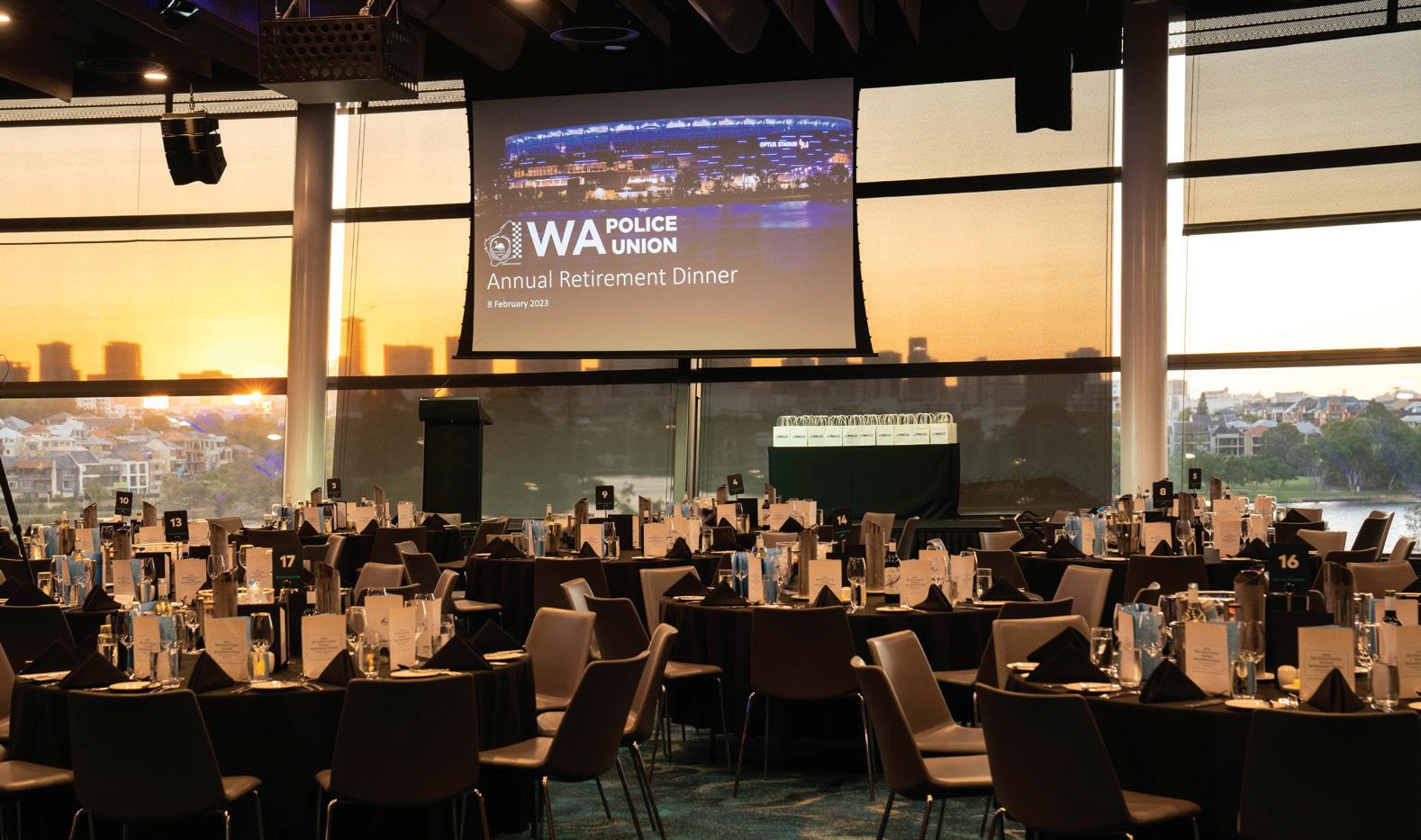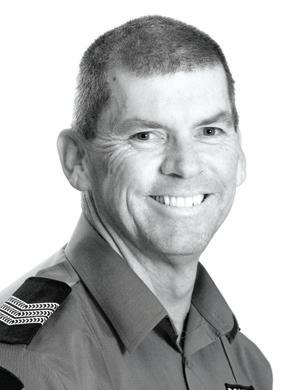
5 minute read
Change and Perseverance
Good evening.
My name is Paul Gale, and I’m the Acting President of the WA Police Union. On behalf of the staff and directors of the union, I welcome you to the 2023 Annual Retirement Dinner of the union. The sponsors for this year’s dinner are Fleet Network and Slater and Gordon, and our MC is sports columnist Tim Gossage. Tonight, we will celebrate the career of 63 police officers who recently retired from the Western Australia Police Force. These officers have, among themselves, over 2,000 years of service, and later I will invite them to the stage and present them with a watch as small form of recognition for their service.
Advertisement

I acknowledge the traditional owners and custodians of the land on which we gather, the Whadjuk people of the Noongar nation. Further, I acknowledge the presence of WA Police Acting Commissioner Kylie Whiteley APM.
The title of my speech is, ‘change and perseverance: how you’ve protected the good and improved the flawed’.
In his book, Reflections on the Revolution in France, the British philosopher Edmund Burke said, and I quote, “Society is a partnership between those who are living; those who are dead; and those who are yet to be born”.
Burke believed that it was the solemn responsibility of every generation to preserve what was good of the previous generation, and to improve what was flawed so that the next generation is better prepared to deal with the challenges and opportunities of the future.
I can’t think of any group of people who better personify that type of thinking than police officers. We are charged with perhaps the most important function in society: to protect and serve the community. And in the exercise of doing that, we must constantly ask ourselves, “are we meeting the current and future community safety needs of the people?”.
That is why in my speech tonight, I will share with you several examples of where I believe that you, the retiring class of 2022, have protected the good and improved the flawed and by virtue of that, created a better police force.
Indigenous Affairs
In 1975, Aboriginal Police Aides were introduced in Western Australia. Ours’ is the state with the highest share of indigenous Australians. Yet for a long time, these Australians were almost exclusively the subject of policing, rather than being a part of it. Today, we have the Police Preparation Programme, and I’m immensely proud to be a part of an agency that strives for greater participation in this regard.
That same year, we saw the introduction of the Police Air Wing: which was a much-needed addition to a state as large as ours’, and a reflection of the increasing use of vehicles in crime.
WOMEN’S INTERESTS
In 1976, women were able to receive all the training and carry out all the duties associated with being a police officer. I’ve always said that police officers are of and from the community, and it’s important that we reflect their image and life experiences. It was only a matter of time until we got our first female Superintendent in 1986, Val Doherty: a woman who also became the first-ever female recipient of the Australian Police Medal in 1991.
Some Labour Rights
In 1986, we saw the introduction of the offence of Assault Police Officer. Apart from being a new and specific offence, this was also a recognition that an assault against a police officer is different than an assault against a member of the public. If you assault a police officer, you not only endanger the welfare of that officer, but you also endanger the service that they provide to the community, and by virtue of that, the safety of members of that community.
The following year in 1987, we saw a wave of new recruits join the agency alongside the America’s Cup yacht race which was being held that year in Perth. It would not at all surprise me to learn that some of you can trace back your career to that memorable event.
Meritocracy
In 1994, the agency moved away from issuing promotions based on seniority to instead issuing them based on merit. This was a landmark reform. We, Australians, are an egalitarian people. We elevate those who do well, not just those who come from a well-off background. Having joined the agency during this period, I’m grateful to have had the opportunity for my work to be assessed on both its strengths and weaknesses. I like to think that that experience has made me a better police officer.
Service Vs Force
That same year, the agency changed its name from the Western Australia Police Force to the Western Australia Police Service. I will go on record and say that, at the time, I was uncomfortable with this change, and I am thankful that in 2017, the agency reverted to its previous and present name of the Western Australia Police Force
Police officers are public servants, but we are not like other public servants. We are authorised by the state to use force to implement the will of the people. Apart from the armed forces, no other group of people has that responsibility. And, rather than downplay that task, I think it’s something of which we should be proud because ultimately it’s reflection to the strength of civil society in Australia that they feel comfortable to provide us with that responsibility without fear that we will endanger their civil liberties.
Joondalup Police Academy
In 2001, the new Police Academy in Joondalup opened its doors for the first time. I daresay that most of you, like me, would have completed their training at the old Police Academy in Maylands. While I very much have fond memories of that place, I welcome the transition to a larger and more capable premises. This development signalled to the people of Western Australia that the Government intended to take seriously the future community safety needs of the people.
Tasers
In 2007, tasers were rolled out to police officers. I recognise that, at the time, their introduction was controversial. But today, their presence is an accepted fact. Any police officer who joins the agency today would struggle to imagine going to work without one. They are a vital component of any police officer’s tool kit, and I’m proud of the role that the union played in rolling them out.
More Labour Rights
The period between 2008 and 2022 saw perhaps the greatest improvement to labour rights for police officers in the history of WA Police.
In 2008, we saw the end of single person patrols and good riddance. The recent tragedy in Queensland involving the shooting deaths of constables Rachel McGrow and Matthew Arnold demonstrate the dangers and outright recklessness of sending a police officer alone on a patrol.
That same year, the Police Medical Expenses for Former Officers Act came into effect. And police officers who suffered an injury during their work were guaranteed the lifetime care and support that they deserve.
In 2009, the Government implemented sentencing for assaulting a police officer. This reform sent a strong message to would-be offenders that if you’re thinking about harming a police officer, you’re going to get locked up.
2019, we were issued with Body-Worn Cameras. This was a sign of the times, and a reflection of the fact that the community wanted to know more about our job.
Last year in 2022, the Police Compensation Scheme came into effect. We all know that our job is a tough job. And for some, it may cause us to retire sooner than we expect. For that reason, it’s vitally important that the Government provides support during these unforeseen circumstances.
Conclusion
None of the reforms that I’ve highlighted to you in my speech tonight would have been possible without your open-mindedness and skills of critical thinking.
From the bottom of my heart, I thank you for your service to the state of Western Australia. I would also like to pay my respects to my friend and mentor James “Jim” Migro who last year retired after a whopping 53 years of service to the agency.
To Jim, and to every single police officer present in the room who has recently retired, I thank you for your service, and I wish you a very happy retirement. Cheers!





